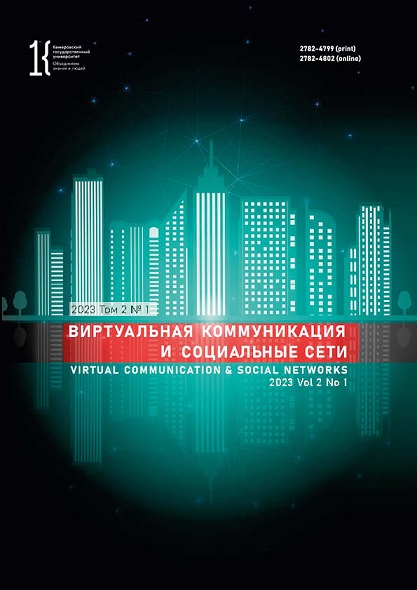Tver, Russian Federation
The paper discusses linguistic autodidactics that lead to the comprehension of social reality. The paper focuses on the Francais Authentique francophone social medium used for language teaching and political discourse comprehension. The author conducted a linguadidactic experiment by using YouTube technologies to practice the French language using authentic traditional and newest sources on the presidential elections in France in 2022. The methodology was based on the authentic theory of discourse analysis frames. The theory features the frames of key communicators and target audiences, factual analysis, analysis of linguistic components of discourse, and the frames of performance, multimedia communication, values, rational argumentation, virtual communication, and feedback. The results shed light upon strategic importance of new media and success of political strategies of centrism in politics.
frankofoniya, avtodidaktika, seti, vybory, vybornaya kommunikaciya, politicheskaya
1. Amzin A., Galustyan A. Gatov V., Kastels M., Kulchickaya D., Loseva N., Parks M., Paranko S., Silantiva O., van der Haak B. How new media has changed journalism. 2012-2016. Ekaterinburg: Gumanitarnyi universitet, 2016, 304. (In Russ.)
2. Bouchev A. V. Aspects of digitalization of communication and communicative specialties. Socio-psychological problems of modern society in the context of digitalization: personality, organization, and management, eds. Barilyak I. A., Korotkina E. D., Rebrilova E. S. Tver: TverSU, 2021, 153-181. (In Russ.)
3. Bouchev A. B. Educational and linguistic skills for international distance learning project. Open and Distance Education, 2009, (3): 34-40. (In Russ.)
4. Bouchev A. B. Discourse analysis: the theory of frames of analysis. Philological Sciences. Scientific Essays of Higher Education, 2021, (5): 13-21. (In Russ.) https://doi.org/10.20339/PhS.5-21.013
5. Bouchev A. B. Ideas of pre-election debates in the USA as a cultural and rhetorical phenomenon. Linguistics & Polyglot Studies, 2012, (47): 22-35. (In Russ.)
6. Bouchev A. B. Political communication: The formation of an interdisciplinary research paradigm in Russia. Philological Sciences. Scientific Essays of Higher Education, 2018, (1): 33-44. (In Russ.) https://doi.org/10.20339/PhS.1-18.033
7. Zubkova L. V. Youtube as the basis of media communication. Actual problems of the humanities: Proc. Sci.-Prac. Conf., Nizhnevartovsk, 20 Feb 2021. Nizhnevartovsk: NVSU, 2021, 439-442. (In Russ.)
8. Ivanov D. V. Virtualization of society. Version 2.0. St. Petersburg: Peterburg. vostokovedenie, 2002, 96. (In Russ.)
9. Castelles M. The power of communication. Moscow: HSE, 2016, 450. (In Russ.)
10. Kryukova E, Saveliev D. 100+ Internet marketer hacks: How to get traffic and convert it into sales. Moscow: Alpina Pablisher, 2018, 303. (In Russ.)
11. Larionova V. A., Karasik A. A. Digital transformation of universities: notes on the global conference EdCrunch Ural on technologies in education. University Management: Practice and Analysis, 2019, 23(3): 130-135. (In Russ.)
12. Solopov D. A., Gladkova K. 10 commandments of the communications war: how to defeat the media, Instagram and Facebook. Moscow: Intellektualnaya Literatura, 2020, 216. (In Russ.)
13. Socio-psychological problems of modern society in the context of digitalization: personality, organization, and management, eds. Barilyak I. A., Korotkina E. D., Rebrilova E. S. Tver: TverSU, 2021, 358. (In Russ.)
14. Social networks: a complex linguistic analysis, eds. Golev N. D., Kim L. G. Kemerovo: KemSU, 2021, vol. 1, 430. (In Russ.)
15. Amossy R. L’ethos au carrefour des disciplines. Rhétorique, pragmatique, sociologie des champs. In: Amossy R. Images de soi dans le discours. La construction de l’ethos. Lausanne: Delachaux & Niestlé, 1999, 125-154.
16. Amossy R., Koren R. Argumentation et discours politique. Mots, 1990, (100): 13-21. https://doi.org/10.4000/mots.19843
17. Bühl A. Die virtuelle Gesellschaft des 21. Jahrhunderts: sozialer Wandel im digitalen Zeitalter. Wiesbaden: Westdeutscher Verlag, 2000, 100.
18. Charaudeau P. L’argumentation dans une problématique d’influence. Argumentation et Analyse du Discours, 2008, 1(1). https://doi.org/10.4000/aad.193
19. Mao X. Mécanisme discursif du discours politique: Analyse sémantique des discours électoraux de Marine le Pen. Master Professionnel 2e année. Paris, 2016, 100.
20. Media education for a digital generation, eds. Frechette J., Williams R. Routledge, 2016, 322.
21. Media education: a kit for teachers, students, parents and professionals, ed. Frau-Meigs D. UNESCO, 2006, 185.
22. Messin K. C. La discours politique relatif a l’amenagement linguistique en France (1997-2002). Paris, 2009, 490.
23. Kroker A., Weinstein M. A. Data trash: the theory of virtual class. Montreal: New World Perspectives, 2001, 98.
24. Rheingold H. The virtual community: homesteading on the electronic frontier. Reading, Massachusetts: Addison-Wesley, 1993, 281.
25. Windisch U. L’argumentation politique. Un phénomène social total. Année sociologique, 1995, 45(2): 59-82.
26. Windisch U., Amey P., Grétillat F. Communication et argumentation politiques quotidiennes en démocratie directe. Hermès, 1995, (16): 57-72.
















